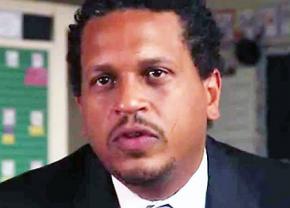What else is kept hidden in Rahm’s Chicago?
writes from Chicago about his quest for information about the firing of a popular elementary school principal--and the typical stonewalling he encountered.
WHEN AN institution as mired in conflict and controversy as the Chicago Public Schools (CPS) ousts one of its highest-profile critics, it can't help but look suspicious. More so when the institution stonewalls legal public access to documents related to the dismissal.
Such is the basis for a lawsuit that my attorney, Dan Massoglia of MK Law, and I filed this week against CPS. The case involves former Blaine Elementary School Principal Troy LaRaviere, who was ousted from his position this spring after slamming the mayor's education policies in a television ad for presidential candidate Bernie Sanders.
LaRaviere, while winning accolades for his work as an educator and steering Blaine to a top ranking, had seen his profile rise as a frequent critic of Mayor Rahm Emanuel and elements of CPS's neoliberal "reform" agenda. Like Chicago Teachers Union President Karen Lewis, LaRaviere became a popular figure in the local media for his anti-Rahm stance, and his name was floated as a potential challenger to Emanuel in the 2019 mayoral election.

Shortly after his suspension in April, Massoglia and I filed Freedom of Information Act (FOIA) requests to investigate whether evidence existed that would substantiate a common suspicion among politically engaged educators--that CPS targets them for their advocacy outside the classroom. We sought to see how this particular incident played out within CPS headquarters, and whether internal documents might reveal that City Hall or other outside actors had influenced the decision.
CPS initially denied two of our FOIA requests for being "unduly burdensome," but when we narrowed in on relevant communications records from top schools officials, the office abruptly cut off contact. Stonewalling, they refused to respond to e-mails, phone calls and a certified demand letter, and ignored an inquiry from the Office of the Attorney General, which we had petitioned to intervene.
With CPS thumbing its nose at its legal obligations under FOIA, the only option remaining to get them to turn over the records was to take them to court. And that's where we'll soon find ourselves.
IT'S IMPOSSIBLE to say what, if anything, CPS is hiding, but the fact that CPS would spend nearly half a year willfully violating the law rather than turning over its records only bolsters the suspicions that linger around its actions.
Politically motivated firings, such as this may be shown to be, can have a chilling effect on educator activism and outspokenness--at a time when such dissent is necessary to save our city's schools from the agenda of disinvestment, privatization and closure.
LaRaviere's ouster is one of several recent dismissals of well-known education activists in Chicago. Tim Meegan, a social studies teacher at Roosevelt High School who ran for alderman against one of the mayor's City Council allies, saw his job eliminated last month after spending 12 years at the school. His case also deserves a closer look.
LaRaviere's dismissal this past spring also came amid the ongoing battle of the Chicago Teachers Union to win a new contract. Emanuel, CPS CEO Forrest Claypool and the handpicked Board of Education are demanding, along with other concessions, the equivalent of a 7 percent pay cut by making teachers pay the full cost of their pension payments.
Should teachers walk out this fall, educator confidence and public support will play critical roles in determining whether the union can replicate the success of their seven-day strike four years ago.
Access to information itself isn't a substitute for action on the streets and picket lines. Certainly, in a city where officials spent 13 months shielding the evidence of Laquan McDonald's execution by police in 2014, trust in transparency ought not to run high.
But as that example showed, sometimes, when such secrets are finally revealed, the public can see that the truth is on the side of our movements for justice.


